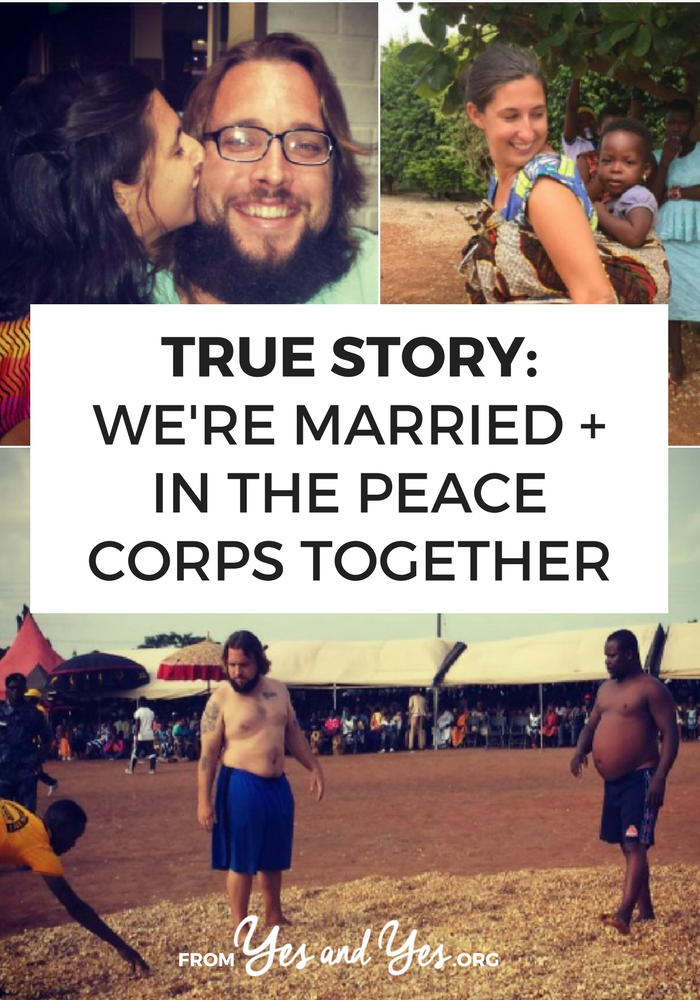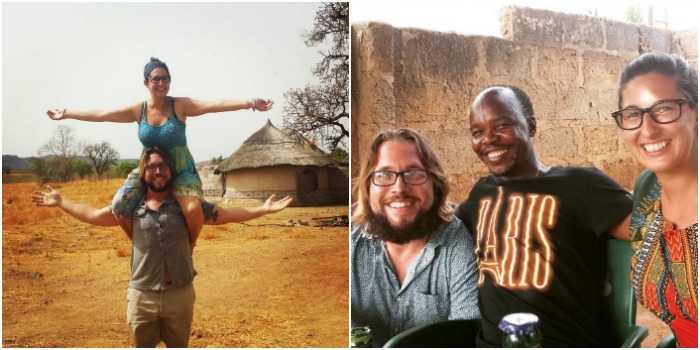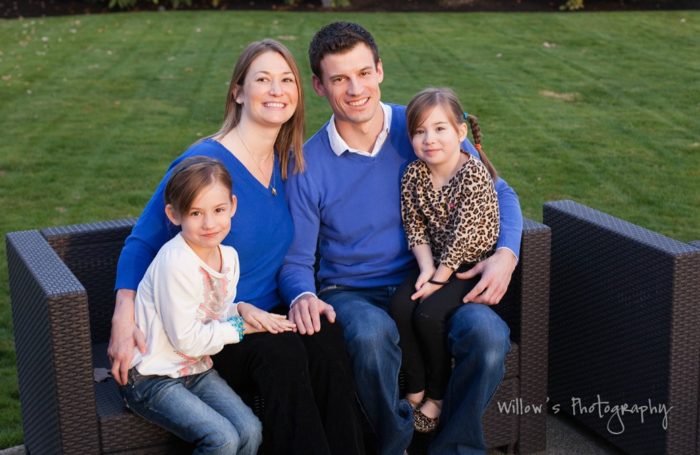
Have you ever wondered what it would be like to be in the Peace Corps – living in another country, getting out of your comfort zone? What if you did that with your spouse?
Would it be amazing? Awful? Both? Today Sammy and Dan are sharing their story of being married in the Peace Corps.
Tell us a bit about yourselves!
Sammy: Hi! I’m Sammy Rowe. I’m 27 years old. I grew up in Gainesville, Florida a small college town.
I’ve worked in social services, but I hope to make a career shift to brand management. Back home you could either find us in the kitchen or at Disney World. With time on my hands, I’ve dipped more into writing, sewing, and even working on a comic strip.
Dan: I’m Dan Rowe, 30 years old, born in Virginia but I’m Orlando to the bone. I graduated from the University of Central Florida with a BS in health sciences in 2011 and since then I’ve worked serving vulnerable populations in various capacities.
In my down time, I have always enjoyed exploring TV and Film, American and International, big studios or student concept art. I also read with much the same range of interest and I like to write when I’m feeling especially ambitious. My great personal mediation lies in cooking, though.
For those of us who don’t know, what is the Peace Corps?
The Peace Corps was founded with the idea to diminish otherness in the mind of Americans regarding people of other nations and vice versa.
To do this, Americans live with the average citizens of other nations for a substantial period of time and pull their weight by helping address needs dictated by the host communities. Host nations invite volunteers and communities request volunteers with varied professional backgrounds.
The Peace Corps has three goals:
- To help people of interested communities to meet their need for trained men and women.
- To promote better understanding of Americans on the part of peoples served.
- To promote a better understanding of other peoples on the part of Americans.
Sharing cooking magazines with students here and sending traditional clothes home is all in a day’s work.

Why did you join? Who’s idea was it?
Sammy: When I was a teenager I wasn’t sure if I wanted to attend college, so I looked at Peace Corps. When I found out you needed a degree, I forgot about it. In college, shortly after I started dating Dan, I looked at it as an option. It was a dream I kept picking up and putting down.
Dan: About four years into our relationship, we had a few beers at Epcot’s Food & Wine Festival and decided we needed to move beyond our front stoop.
We had both been in human services since graduating so expanding our horizons and living in service met neatly when we revisited the idea of Peace Corps. We knew to serve together we needed to be married, so we tabled it. Two years later we got married and three months after the ceremony we started the application.
Can you walk us through the application and placement process?
Sammy: The application was all online. I don’t remember all the details, but you had to submit proof of education and work experience, an essay, etc.
What country they place you depends on what skills you have, what countries need those skills, and a small percent on where you say you want to go.
There is an interview during training for community placement. You can tell them some of your oh-no-nos and they do a great job of placing volunteers in communities they will feel comfortable in.
Dan: My standout memories from the application process are more emotional: anxiety, then elation, then the anticipation before departure. I compulsively edited my essay, having some qualified friends give notes.
The medical clearances were exhaustive and kind of pricey. Acceptance came WAY faster than I expected and departure was only a few months later. Application to departure was like 10 or 11 months.
How do other Peace Corps volunteers react to you guys doing this as a couple?
Sammy: Every few months a new crop of volunteers comes in and another crop leaves. In the year and a half we have been here there have been other married couples, and there are a few volunteers who are married but their spouses are back home.
Being young and married in Peace Corps at times feels like being the odd couple at a singles party. Single volunteers don’t reach out to us for friendship and mutual support as eagerly as they do with each other.
Marriage is well respected in Ghana. When we first got to our community several people blessed us with having twins. Time will tell if their prayers were answered. (I’m hoping for yes!)
Dan: Single volunteers believe our service is a breeze because we are here with someone and we each receive a living allowance. We explain that we have our own challenges, but it’s like explaining car maintenance to a concert cellist, no frame of reference.
In general, though, volunteers are wonderful. We’ve made some friends that will last a lifetime.
From Ghanaians, we receive more respect as autonomous adults. Fewer people thought that we need to be taken care of because of the strong family culture here. Conversely, that family culture leads to some sincere puzzlement when they hear we have no children.
Are there any unique stressors that come from doing this while married?
Sammy: The funny thing is a major struggle for volunteers is the isolation; a major struggle for us is that we never have alone time.
It takes so much effort to be aware of and protect your emotions; to do so for another person is even harder. With limited resources it can be a pain to share everything you own, especially when candy comes in a care package.
Dan: Integration is the goal of Peace Corps, but isolation comes first and comes often. With two people sharing a 12 x 12 room in equatorial heat, isolation, frustration, homesickness, anxiety, insecurity, physical ailments (familiar and otherwise) is individual and shared.
Sharing means amplification. We have faced and resolved issues we wouldn’t have touched in 20 years in the states. It’s like a marriage pressure cooker. Either it blows up or you get a divine meal.
What are the benefits?
Sammy: You have someone who can immediately remind you why you joined or that you can accomplish anything. It’s so helpful to be able to joke about something when it happens, rather than sit on it and stew.
I don’t think I would have had the courage to do this alone. There are so many memories and lessons I look forward to sharing with my future children and I think it’s beautiful to be able to tell them their father was there experiencing it with me.
Dan: Having a spouse provides a buttress to your emotional levy system. It validates your experiences, positive and negative. You don’t cry alone, and just like sharing negatives amplifies them, sharing victories does exactly the same.
We once heard a returned Peace Corps volunteer remark that if your marriage survives Peace Corps it can survive anything. So once you realize you’re surviving, you feel this steady security.
Have you had any moments when you wanted to throw in the towel?
Sammy: There’s a fun little quote known in the Peace Corps world: “It’s the hardest job you’ll ever love.” There are times I question why I’m here and if it’s even worth it. But it is, it so is, truly a once in a lifetime opportunity.
Dan: Quitting crosses everyone’s mind. We put all our eggs in this basket, though: personal, professional, financial. I think that’s the only way to do this. You can’t have a safety net. If you do, you may feel comfortable with that option when those low moments come.
What’s surprised you the most about this experience?
Dan: As health volunteers, we don’t work in schools or for an organization, so after training, *blip* that was it. That first week at site was a sort of “morning after” haze, just waiting for stimulus or instruction. Then reality hit.
Needs assessment, work, introductions; those were on us. We have outstanding community counterparts that really greased the wheels of this process. That abject lack of structure is still overwhelming sometimes.
Sammy: I had no idea what to expect here so everything was a surprise. I am always in awe of the food. A good portion of the local food is similar to Southern American and Latin food.
Historically, it makes sense as many of the slaves in America and the Caribbean countries came from Ghana and with them they brought their knowledge and traditions of cuisine.
What have you learned from this that any of us could apply to our daily lives?
Sammy: Take the time to really know yourself. We forget to do that in the modern world, but it’s essential to a happy life.
Unplug once in a while in order to reflect or pick up other activities you can enjoy. Ignore some of the conveniences in the western world and you’ll quickly learn how clever you are.
Dan: Cultural lenses are unavoidable but whatever narrative we instinctively write about others in our mind is wrong. I mean even small assumptions on a person to person basis. We live in a country now with 80+ individual languages, several tribes joined under each language, and several historically unique communities joined under each tribe.
Each person carries identities informed by all of these elements, along with faith, family, and self. 27 million citizens of Ghana, each with all this inside them. It would be impossible for neighbors to judge each other’s behavior based on their own values.
Due to the remarkable diversity in such a concentrated space, recognition of other’s traditions is a default, as opposed to automatic judgement, confusion, or frustration.
Thanks so much for sharing your story, guys! Do you have any questions for them?
P.S. If you’d like to travel more, but you can’t make the time commitment required by the Peace Corps, here are all my best travel tips!






Sammy and Dan sound like the perfect couple for each other, with their ability to face up to new challenges and support each other in times of hardship! Really do admire them, not every relationship would be able to stand a setting like theirs!
Charmaine Ng | Architecture & Lifestyle Blog
http://charmainenyw.com
That’s so sweet of you to say! It’s a tough but very rewarding ride.
the article title says peace corp
My amazing daughter and son in law. Great interview. I actually learned little bit more about them.
Nice article. So proud of them. What an awesome experience.
Aw, lovely!
Peace Corps is my big dream, but it has been a non-starter in our marriage. I got a medical denial shortly before we married (ten years ago, when I was quite healthy, and with no explanation WHY), and want to try again, but now my spouse does not want me to leave without them and will not go with me. So that’s the end of this story for now, I guess. Who knows what the future holds. :-\
I’m sorry to hear that. Sometimes they deny if it doesn’t seem the country would have adequate medical services for any medical conditions you night have.
I hope you find another volunteer or career opportunity! There’s a lot of great chances out there.